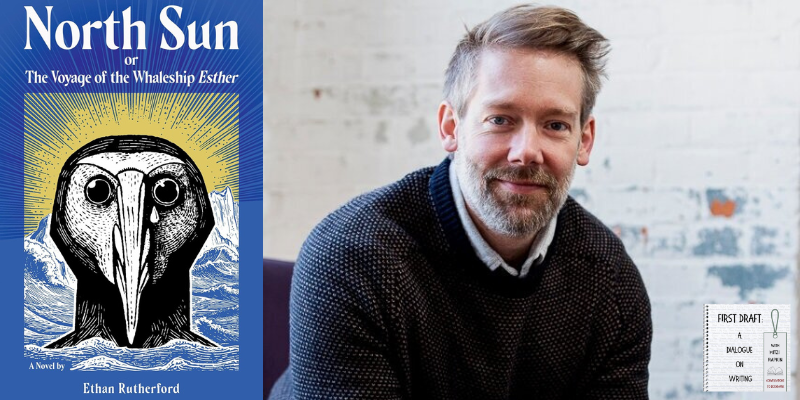First Draft: A Dialogue of Writing is a weekly show featuring in-depth interviews with fiction, nonfiction, essay writers, and poets, highlighting the voices of writers as they discuss their work, their craft, and the literary arts. Hosted by Mitzi Rapkin, First Draft celebrates creative writing and the individuals who are dedicated to bringing their carefully chosen words to print as well as the impact writers have on the world we live in.
Article continues after advertisement
In this episode, Mitzi talks to Ethan Rutherford about his new novel, North Sun.
Subscribe and download the episode, wherever you get your podcasts!
From the episode:
Mitzi Rapkin: North Sun is told in told in sections, but it is not your traditional prose, like if you were looking through it through in a bookstore, you wouldn’t see pages and pages and paragraphs of text instead you have these very short chapters, some that are just one paragraph long, some that are a few pages, but it’s almost like vignettes. How did you land on that structure?
Ethan Rutherford: Well, it’s all part of making a book, making something from nothing, and not knowing how to do it. I had written it in a very traditional way, and just felt too dense. It didn’t have enough space to breathe. And so, you know, another way of thinking about this novel is I came to think of it as you know, it is very much a traditional whaling sort of story. It is about whaling. It is about the brutality of the American whaling industry in a lot of ways. But there’s a lot of moments in a journey where just nothing is happening. You go today, there were more waves, more water, and then for me, that became a really instructive thing, because you go, Well, if you don’t want this to be just sort of entirely as repetitive as these journeys actually are, you think about the book, and the page itself is like a vessel. And if you’ve built something with this constraint, you have a beginning, a middle and an end, and you have location, then I guess maybe like the pleasure and opportunity of this book was I actually thought of this novel as a ship, and then as a writer, I felt like it was my job to figure out what it was that I was obsessed with and wanted to say, and just kind of load those things into the ship in a way that would help them kind of sing. So, there’s a couple sort of secret obsession. Like people are like, oh yeah, this is a book about whaling, and it is that. But to me, it’s also a book about like memory, like my dad is in memory care now, and while I was writing the book, he was sort of progressively losing his memory, and I didn’t know how to write about that, but I felt like I had to in some way because I was thinking about it all the time in the same way that I was thinking about, how do you raise kids in a world that is a pretty brutal world, right? How do you protect them from it, but how do you also expose them to it? And so, you start putting these things into your ship, and then suddenly you realize that it’s a little bit overcrowded, and you start to think about structure and constraint and as a way of answering your question about these small vignettes and how they how they sort of work with each other. It’s a book, strangely enough, that began in music for me. I really thought of each page as a wave or sort of like a little song, like a little snippet of this journey. And that just sort of gave itself to the structure that it found. Each chapter has a beginning, a middle and an end in this kind of singing in its own key, if that makes sense. And so, you’re making these little containers within this larger vessel that you can that you can fill up.
***
Ethan Rutherford’s new novel is The North Sun or the Voyage of the Whaleship Esther. He is the author of two story collections—Farthest South and The Peripatetic Coffin and Other Stories—and for these works has been named a finalist for the Los Angeles Times Art Seidenbaum Award for First Fiction, a finalist for the John Leonard Prize and CLMP’s Firecracker Award, received honorable mention for the PEN/Hemingway Award, was a Barnes & Noble Discover Great New Writers selection, and was the winner of a Minnesota Book Award. He received his MFA in Creative Writing from the University of Minnesota and now teaches Creative Writing at Trinity College.
